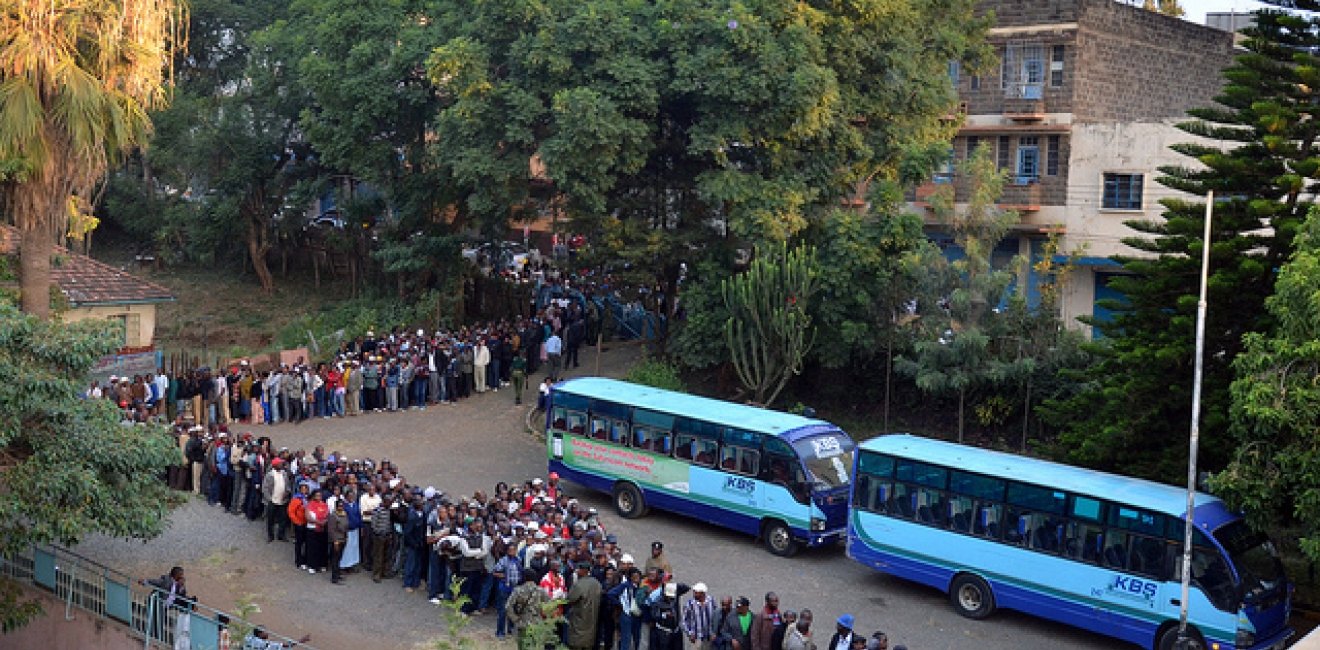
A blog of the Africa Program
[caption id="attachment_13021" align="aligncenter" width="600"] Citizens line up to vote in the 2013 Kenyan elections. Photo by Commonwealth Secretariat, via Flickr. Creative Commons.[/caption]
"Mankind must put an end to war, or war will put an end to mankind" - John F. Kennedy
After Kenya's 2007 general elections results were announced, there was a surge of violence between supporters of the winning party and the opposition. The opposition claimed the elections had been rigged, an accusation that resonated after international observers, including the European Union, noted incidences of election malpractice.
More than a thousand people were killed in the post-election violence, and hundreds of thousands were displaced from their homes. Ten years later, some victims still complain of neglect by the government. Many victims are still working their way through the legal system, asking the courts to compel the government to compensate them. In a case filed by 25 internally displaced persons (IDPs) at the High Court, psychologist Dinah Kituyi told the court that victims are still suffering from post-traumatic stress, and survivors need medical care. Early this year, a group of IDPs in Naivasha and Nyanza threatened to boycott the upcoming 2017 elections until they were compensated for the suffering they said they experienced in the 2007 violence. Other victims of the 2007 violence who fled to Uganda's Kiryadongo Refugee Camp returned to Kenya and camped outside Parliament for almost a month in 2016, demanding solutions to their grievances, to no avail.
The government and the opposition have played a blame game about responsibility for the violence, instead of finding a long-lasting solution. The government has assured victims they will be compensated, but only time will tell. Dealing with the continuing issue of the victims of the 2007 violence is important not just for doing right by the victims of violence, but also for ensuring the stability and justice of Kenya's upcoming general elections in August 2017.
Violence after the 2007 General Elections
The violence killed at least 1,100 people, destroyed more than 115,000 private properties, and displaced about 650,000 people from their homes. There was a massive violation of human rights, with people forced from their homes and houses torched down to ashes. Instead of protecting citizens, the police used excessive force against protestors. Sexual violence was widespread, and perpetrators included close neighbors, militia groups, humanitarian workers, and the police. Many of these cases went unreported due to the stigmatization associated with rape, the lax attitude of police, and because some victims claimed they were turned away by doctors due to their ethnicity.
The Waki Commission, which was formed in 2008 to investigate the circumstances that led to the post-election violence, noted the role of historical land conflicts. According to the commission's findings, much of the violence was planned, and tribal gangs were used to expel opponents from their communities.
Politicians contributed to the violence through ethnic incitement, and the media was accused of fueling violence by broadcasting hate speech, especially through vernacular radio stations (which broadcast in languages other than English and Swahili). The current president Uhuru Kenyatta and his deputy William Ruto were charged for crimes against humanity at the International Criminal Court, though their cases were terminated due to insufficient evidence. The Chief Prosecutor of the International Criminal Court, Fatou Bensouda, complained that the Kenyan government was not willing to cooperate by providing crucial documents. So what is next for the victims?
The Role of the Kenyan Government
There have been various efforts by the government to compensate victims of the 2007 post-election violence, but many have yet to receive compensation ten years later. After the peace accord of February 2008 that marked the end of conflict, the government launched an operation on May 5, 2008 dubbed "Rudi Nyumbani," meaning "return home," with the goal to return people who had fled or were displaced from their homes during the post-election violence. The resettlement process was not successful, due to a lack of consultation between the victims and the government, poor profiling of IDPs, corruption, tribalism, and funding issues. The government failed to build promised houses due to insufficient funds; instead it settled for giving victims $100, which was not a large amount to open a new chapter in their lives.
In October 2012, the Kenyan Parliament passed the Prevention, Protection and Assistance to Internally Displaced Persons and Affected Communities Act 2012, which is in line with the UN basic principles and guidelines of gross violations of international law. The new act requires the government to create a database of IDPs and consult IDPs on relevant laws. It also penalized anyone found guilty of masquerading as an IDP.
In March 2015, the president launched a restorative fund with 10 billion Kenya shillings (more than $80 million USD) to assist victims of the post-election violence; however, as of yet the victims have not benefited because of delays in the release of money. Michael Ndugu, Director of National Values and National Cohesion in the Office of the President, noted there was no clear policy of reparation to implement funding and the government was trying to find a solution. Last year, the government announced that it had set aside six billion Kenyan shillings for 900,000 victims who had been missed in the profiling exercise in 2007. The chairman of the National IDPs Coordination Committee, Sheikh Adan Wachu, noted that they will be compensated after their status is verified, but the strategy the government will use to reach all victims is still unclear.
Moving Forward
Poor profiling — ensuring that the right people were targeted for help — in 2007 complicated the resettlement process. IDP issues in Kenya are complex; some who had been displaced following the 1992 and 1997 elections and are still seeking justice today. In 2009, the Truth, Justice, and Reconciliation Commission was formed to investigate human rights violations by the state since independence, including the 2007 violence. The 2,210 page report was delivered to the president, but the implementation of the report has been very slow due to a lack of political goodwill.
The government needs a clear reparation policy which provides a framework for compensating IDPs. The difficulties of past efforts shows that the profiling exercise should be timely, all parties must be included, and compensation must be provided nationally at the same time. The findings of the TJRC report should also be implemented in order to put the violence and displacement in the past. And finally, to deal with a potent cause of violence, the National Land Commission should also work to resolve pending historical land disputes and come up with a timeline to finalize and offer solutions to these cases.
There is also an important role to be played by groups outside of the government and those directly affected. Civil right organizations should be active in empowering IDPs, both in Kenya and around the world, to know and demand their rights and seek legal redress. The media also has a role to play – it has important agenda-setting powers, and it can highlight the continuing plight of the victims to encourage government action. This should not only happen when elections are coming.
As Kenya prepares for the upcoming August 2017 election, violence has already been reported during the party primaries. The relevant authorities need to act swiftly to show the world that Kenya has learned from the 2007 violence and will not repeat it. If violence erupts again, many more will be displaced; a difficult burden for a country that already hosts Daadab, the fourth largest refugee camp in the world with more than 250,000 refugees.
Sharon Anyango is a Southern Voices Network for Peacebuilding Scholar at the Wilson Center from February to April 2017. She is a Communication and Outreach Officer at the African Technology Policy Studies Network (ATPS), a member organization of the Southern Voices Network for Peacebuilding.
Author

Communications and Outreach Officer, African Technology Policy Studies Network, Kenya

Africa Program
The Africa Program works to address the most critical issues facing Africa and US-Africa relations, build mutually beneficial US-Africa relations, and enhance knowledge and understanding about Africa in the United States. The Program achieves its mission through in-depth research and analyses, public discussion, working groups, and briefings that bring together policymakers, practitioners, and subject matter experts to analyze and offer practical options for tackling key challenges in Africa and in US-Africa relations. Read more

Explore More in Africa Up Close
Browse Africa Up Close
The Innovative Landscape of African Sovereign Wealth Funds



